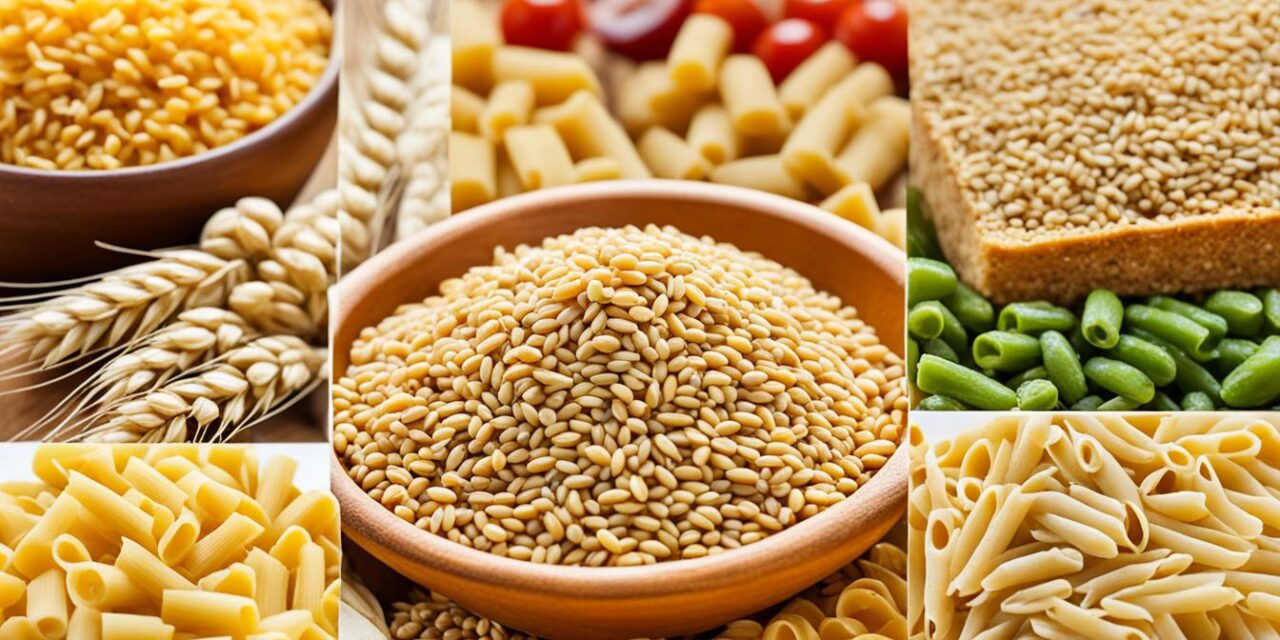Did you know that an estimated 1% of the global population suffers from celiac disease, a form of gluten intolerance? That’s over 70 million people worldwide who must strictly adhere to a gluten-free diet to avoid serious health consequences. But what about the rest of us? Do you really need to avoid gluten? Let’s dig deeper into the truth about gluten and its impact on our health.
Key Takeaways:
- Celiac disease affects an estimated 1% of the global population, requiring a strict gluten-free diet.
- Gluten intolerance encompasses celiac disease, wheat allergy, and non-celiac gluten sensitivity.
- Research is inconclusive on the broader health benefits of a gluten-free diet for those without specific gluten intolerance.
- Individual health needs and a proper diagnosis should guide the decision to follow a gluten-free diet.
- Consult with a healthcare professional if you have concerns about gluten sensitivity or dietary restrictions.
What Is Gluten?
Gluten is not just an ordinary protein. It’s a notorious troublemaker that has sparked debate and changed diet choices for many. But what exactly is gluten?
Gluten is a collective term that refers to many different types of proteins found in wheat, barley, rye, and triticale. These proteins, known as prolamins, possess unique properties that make them highly elastic. In the baking world, gluten is like the superhero that gives dough its structure and elasticity, allowing it to rise and hold together.
| Gluten | Proteins | Source |
|---|---|---|
| gliadin | wheat | |
| hordein | barley | |
| secalin | rye | |
| avenin | triticale |
Gluten is like the architectural glue that holds together the structure of your favorite bagel or that perfect slice of bread.
While gluten plays a crucial role in baking, it has earned a mixed reputation among health-conscious individuals. For some, gluten is a harmless protein that adds flavor and texture to various foods. However, for others who are gluten-intolerant, it can cause a range of health issues.
Gluten: Love it or Hate it?
The story of gluten is complex, and opinions about it are diverse and sometimes passionate. Let’s explore the different forms of gluten intolerance in the next section.
Gluten Intolerance
Gluten intolerance encompasses a range of conditions, including celiac disease, wheat allergy, and non-celiac gluten sensitivity. Each condition has its own characteristics and impact on the body.
The Many Faces of Gluten Intolerance
Let’s take a closer look at each of these conditions:
- Celiac Disease: This autoimmune disease affects the small intestine and is triggered by the consumption of gluten. When people with celiac disease consume gluten, their immune system responds by damaging the lining of the small intestine, leading to various symptoms and long-term complications.
- Wheat Allergy: This is an abnormal immune response to specific proteins found in wheat. When someone with a wheat allergy consumes wheat or wheat-derived products, their immune system reacts by releasing antibodies, triggering symptoms such as rash, hives, difficulty breathing, and gastrointestinal distress.
- Non-Celiac Gluten Sensitivity: Individuals with non-celiac gluten sensitivity experience symptoms similar to those with celiac disease but without the intestinal damage or immune response associated with celiac disease or wheat allergy. The exact mechanisms of non-celiac gluten sensitivity are not fully understood, but it is believed to involve a different immune response or intestinal sensitivity to gluten.
While gluten intolerance may have similar symptoms, it’s important to differentiate between these conditions for proper diagnosis and management.
Understanding Gluten Intolerance Symptoms
The symptoms of gluten intolerance can vary from person to person and may include:
- Abdominal pain and bloating
- Diarrhea or constipation
- Nausea and vomiting
- Fatigue and weakness
- Headaches
- Joint pain
- Skin rashes
If you suspect you have a gluten intolerance, it’s important to consult with a healthcare professional to receive an accurate diagnosis and appropriate treatment.
Did You Know?
Approximately 1% of the population has celiac disease, while the prevalence of wheat allergy is estimated to be around 0.4%. Non-celiac gluten sensitivity is believed to affect a larger number of people, but its exact prevalence is still unclear.
Managing gluten intolerance typically involves adopting a gluten-free diet, avoiding gluten-containing foods, and finding suitable alternatives. A gluten-free diet can be challenging, but with proper guidance, it is possible to lead a healthy and fulfilling life without compromising on taste and nutrition.
Understanding the different types of gluten intolerance is crucial for individuals seeking relief from related symptoms and maintaining a healthy lifestyle. Let’s explore how a gluten-free diet can benefit other populations in the next section.
Other Populations That May Benefit From a Gluten-Free Diet
If you think that a gluten-free diet is only for individuals with celiac disease or gluten sensitivity, think again! Recent research has indicated that following a gluten-free diet might have benefits for a range of other conditions, including autoimmune diseases, bowel diseases, fibromyalgia, endometriosis, and even schizophrenia.
Let’s delve into the potential benefits of a gluten-free diet for these conditions:
Autoimmune diseases
Studies have suggested a link between autoimmune diseases and gluten consumption. Conditions like rheumatoid arthritis, multiple sclerosis, and Hashimoto’s thyroiditis have shown improvement in some individuals when gluten was eliminated from their diets. While more research is needed to fully understand the connection, adopting a gluten-free diet could be worth exploring if you’re living with an autoimmune disease.
Bowel diseases
Certain bowel diseases, such as Crohn’s disease and ulcerative colitis, involve chronic inflammation in the digestive system. Some individuals with these conditions have reported symptom relief after removing gluten from their diets. While a gluten-free diet may not be a cure-all, it could help manage symptoms and improve overall well-being.
Fibromyalgia
Fibromyalgia is a chronic condition characterized by widespread pain and fatigue. While the exact cause is unknown, some evidence suggests a potential association between gluten sensitivity and fibromyalgia symptoms. By adopting a gluten-free diet, individuals with fibromyalgia may experience a reduction in pain and fatigue, leading to an improved quality of life.
Endometriosis
Endometriosis is a condition in which tissue similar to the lining of the uterus grows outside the uterus, causing pain and fertility issues. Although the relationship between endometriosis and gluten is still being studied, anecdotal evidence suggests that a gluten-free diet may alleviate symptoms for some individuals. If you have endometriosis, consult with your healthcare provider to determine if a gluten-free diet could be beneficial for your specific case.
Schizophrenia
Emerging research has explored the potential impact of gluten on mental health conditions, including schizophrenia. Some studies have found a higher prevalence of gluten sensitivity in individuals with schizophrenia, suggesting that a gluten-free diet may help manage symptoms. However, further research is needed to establish a conclusive link between gluten and schizophrenia.
While the evidence is still evolving, adopting a gluten-free diet could be an avenue worth exploring if you have any of these conditions. Discuss with your healthcare provider to determine if a gluten-free diet is suitable for your specific needs and to ensure that you maintain a well-balanced and nutritionally adequate diet.
Remember, each person’s medical situation is unique, and nothing substitutes professional medical advice. If you suspect gluten may be impacting your health, consult with a healthcare professional for a proper diagnosis and guidance.
Should Everyone Avoid Gluten?
While the gluten-free diet has gained popularity in recent years, it remains unclear whether everyone should avoid gluten, regardless of their health status. Research suggests that certain wheat proteins and other factors present in gluten-containing foods may contribute to symptoms of non-celiac gluten sensitivity. However, further research is necessary to determine the broader health benefits and risks associated with a gluten-free diet.
It is important to note that individuals with celiac disease, wheat allergy, or diagnosed non-celiac gluten sensitivity must adhere to a gluten-free diet to manage their conditions effectively. For these individuals, consuming gluten can lead to gastrointestinal discomfort, inflammation, and other adverse reactions.
Non-celiac gluten sensitivity refers to individuals who experience symptoms after consuming gluten but do not have celiac disease or a wheat allergy.
To better understand the potential health implications of a gluten-free diet, researchers are actively investigating its effects on various health conditions. While some studies have demonstrated potential benefits such as improved digestion, reduced inflammation, and enhanced nutrient absorption, the findings are not conclusive.
“It is important to note that a gluten-free diet should only be followed under the guidance of a healthcare professional to ensure proper nutritional balance and to prevent unnecessary restrictions that may hinder overall health,” says Dr. Amanda Thompson, a renowned nutritionist.
Key Considerations
- Individuals considering a gluten-free diet for health benefits should consult with a healthcare professional or registered dietitian for personalized guidance based on their specific health needs and medical history.
- While some individuals report improvements in symptoms like bloating, fatigue, and brain fog after eliminating gluten, these improvements may be attributed to overall dietary changes rather than the absence of gluten alone.
- It is crucial to distinguish between a gluten sensitivity and other underlying health conditions. Proper diagnosis plays a vital role in determining the most appropriate dietary approach.
| Health Benefit | Evidence |
|---|---|
| Improved Digestion | Some individuals with gastrointestinal disorders report relief from symptoms such as diarrhea and abdominal pain after adopting a gluten-free diet. |
| Reduced Inflammation | Preliminary studies suggest that a gluten-free diet may help reduce inflammation markers in individuals with certain autoimmune conditions. |
| Enhanced Nutrient Absorption | Individuals with celiac disease may experience improved nutrient absorption and associated health benefits upon removing gluten from their diet. |
While some may find health benefits in a gluten-free diet, it is essential to approach this dietary change with caution. Restricting gluten without proper medical guidance can lead to potential nutrient deficiencies, as gluten-containing foods, such as whole grains, also provide essential vitamins, minerals, and dietary fiber.
Ultimately, the decision to follow a gluten-free diet should be based on individual health needs and proper diagnosis. Ensure you consult with a healthcare professional or registered dietitian to make informed dietary choices that suit your specific requirements.
Why Many People Feel Better
It’s no secret that many people report feeling better on a gluten-free diet. While there may be multiple factors at play, one significant reason could be the reduction in processed foods.
Processed foods are often high in unhealthy fats, sugars, and artificial additives, which can contribute to weight gain, fatigue, and joint pain. By eliminating processed foods from your diet and focusing on whole, natural foods, you provide your body with the nutrients it needs to thrive.
Furthermore, weight loss is a common benefit experienced by individuals who adopt a gluten-free lifestyle. By cutting out gluten-containing foods, you may naturally reduce calorie intake and improve your body’s ability to burn fat.
Fatigue and joint pain are also issues that can be alleviated or reduced through a healthier diet. By eliminating gluten, you may reduce inflammation in your body, resulting in decreased fatigue and improved joint function.
So, while the reasons behind feeling better on a gluten-free diet may be multifaceted, cutting back on processed foods and embracing a healthier way of eating undoubtedly play a significant role.
Common Myths and Facts About Gluten
There’s a lot of misinformation circulating about gluten, but let’s set the record straight. Gluten is a protein found in wheat, rye, barley, and triticale. Contrary to popular belief, it is not necessarily bad for you unless you have celiac disease, wheat allergy, or non-celiac gluten sensitivity.
Gluten-containing foods can be part of a healthy diet for most people. The key is to understand your own body and consult with a healthcare professional if you suspect any gluten-related issues.
Myth: Eating gluten causes weight gain.
Fact: There is no evidence to support the claim that gluten causes weight gain. Weight gain is more likely to be influenced by overall calorie intake and lifestyle factors.
Myth: A diagnostic test can determine gluten sensitivity.
Fact: Currently, there is no reliable diagnostic test for non-celiac gluten sensitivity. A diagnosis is usually made based on symptoms and a process of elimination.
If you suspect you have gluten sensitivity, it’s important to receive a proper diagnosis before eliminating gluten from your diet.
“Remember, just because cutting out gluten has become a popular trend, it doesn’t mean it’s the right choice for everyone.”
If you’re concerned about gluten sensitivity, consult with a healthcare professional who can guide you through the diagnostic process and help you make informed decisions about your diet.
Potential Symptoms of Gluten Sensitivity
If you think you may have gluten sensitivity, here are some potential symptoms to look out for:
- Abdominal pain or bloating
- Diarrhea or constipation
- Nausea or vomiting
- Headaches or migraines
- Brain fog or difficulty concentrating
- Fatigue or lack of energy
- Joint pain or swelling
- Skin rash or itching
Gluten-Containing Foods and Alternatives
| Gluten-Containing Foods | Gluten-Free Alternatives |
|---|---|
| Wheat | Rice, quinoa, corn, oats (gluten-free certified) |
| Rye | Rice, quinoa, corn, oats (gluten-free certified) |
| Barley | Rice, quinoa, corn, oats (gluten-free certified) |
| Triticale | Rice, quinoa, corn, oats (gluten-free certified) |
Conclusion
So, what’s the verdict on the gluten-free diet? Before you say goodbye to bread and pasta, take a moment to consider the facts. While a gluten-free diet is essential for those with celiac disease or gluten sensitivity, there is still much to learn about the broader effects of gluten on our health.
Don’t fall victim to the gluten myth that cutting out gluten will automatically make you healthier. The truth is, there is no one-size-fits-all approach when it comes to diet. It’s important to make informed decisions based on your individual health needs and a proper diagnosis.
Remember, gluten-containing foods are not inherently bad for you unless you have a specific condition. Eating gluten does not automatically lead to weight gain, and there is no one diagnostic test for gluten sensitivity. If you suspect you may have an issue with gluten, consult with a healthcare professional to determine the best course of action.
So, before you jump on the gluten-free bandwagon, separate the gluten facts from the gluten fiction. Your health is too important to be swayed by trends and misinformation. Make smart choices, be well-informed, and enjoy a diet that suits you best.
FAQ
Do I need to avoid gluten?
What is gluten?
What does gluten intolerance refer to?
Who else may benefit from a gluten-free diet?
Should everyone avoid gluten?
Why do many people feel better on a gluten-free diet?
What are some common myths and facts about gluten?
What is the conclusion about gluten?
MORE SOURCES TO READ:
- https://www.theguardian.com/lifeandstyle/2018/aug/07/not-just-a-fad-the-surprising-gut-wrenching-truth-about-gluten
- https://www.healthline.com/nutrition/is-gluten-bad
- https://www.everydayhealth.com/diet-nutrition/diet/gluten-myths-facts-know/
![]()













Recent Comments